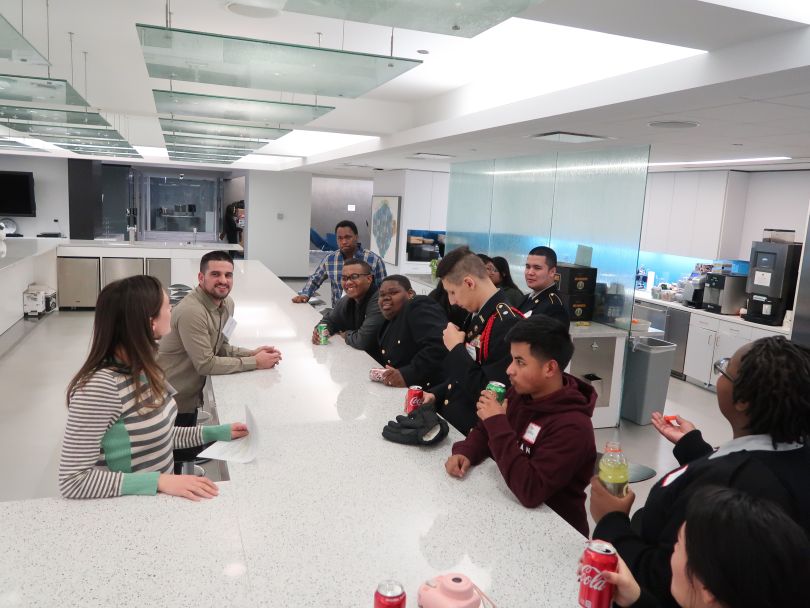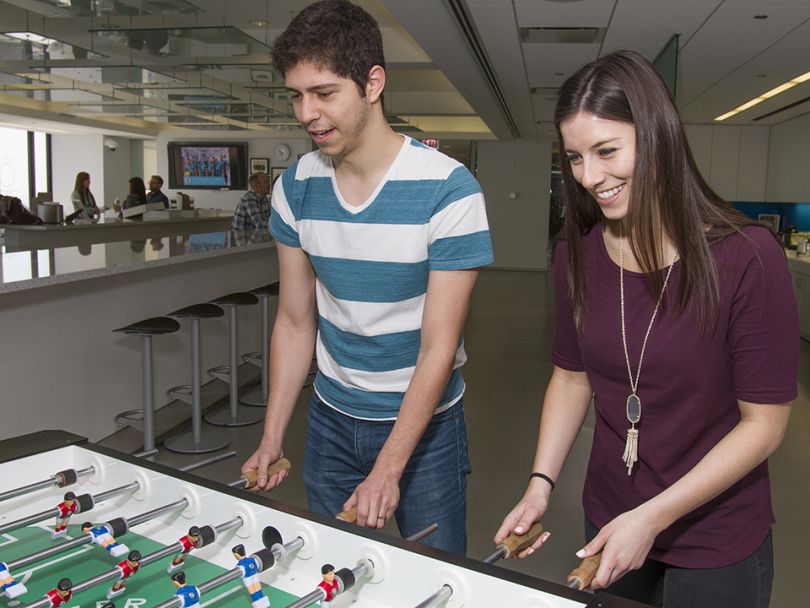
To be sure, people want to join Chicago’s IMC because of the professional opportunities. But for hardware engineer Stephan Teran, it was actually a less typical perk that sold him on moving his family, including five children, to join the company: its commitment to philanthropy.
“Whereas in other companies, philanthropy feels abstract and mainly a tax write-off, here it is woven into everyday office culture,” said Teran.
IMC has been giving back since its start in 1990s Amsterdam. Today, the Chicago office participates in grant-making with partner schools and education nonprofits. The company also makes it easy for employees to volunteer by handling logistics — even bringing students to the office for tutoring.
In 2017, about 130 IMC employees volunteered around Chicago, playing sports with kids, tutoring students and mentoring high schoolers. Employee-driven giving topped $445,000, and the company supported 19 Chicago schools, donating $630,000.
Teran said: “Beyond my personal philosophy, if a company is generous towards others, what does it say about how they will treat their own employees?”
We spoke to Teran and two colleagues about just that. They told us how IMC’s philanthropy creates a uniquely bonded culture — and makes them better professionals and more engaged citizens.


YEAR FOUNDED: 1989
EMPLOYEES: 220 in Chicago; 236 nationwide.
THE COMPANY: A technology-driven trading firm active on more than 100 stock exchanges worldwide.
THE PHILANTHROPY: IMC supports grant-making and volunteering, with a focus on Chicago-area schools, education nonprofits and U.S. sport-based youth development.
MAKE YOUR MARK: Annual program where IMC employees nominate charities to receive the company’s grants, the amounts of which are based on votes by IMC employees.
MATCHY MATCHY: IMC offers financial matching of up to $1,000 annually for charitable donations.
186: Number of organizations that employee-driven giving supported in 2017.
RUBIK’S CUBIX: The current speed-cubing champ at IMC can solve a Rubik’s Cube in less than two minutes — blindfolded.

Stephan Teran, Hardware Engineer
Teran designs hardware to help IMC take advantage of every nanosecond, staying one step ahead of competitors. From a philanthropy standpoint, he often tutors high school kids at the company’s Chicago office or helps out at area schools. “For several of the activities, I am able to bring my family to help as well,” he said.
BEYOND WORK: He has five kids.
What attracted you to IMC in the first place? Was the company’s philanthropy a factor before you arrived?
Teran: It was a big factor in deciding to take this job. Moving my family from California was a big decision. The fact that I was offered a fantastic job by a company that really cares about giving back made the decision significantly easier. During the interview process, I asked several questions about IMC’s philosophy on philanthropy. What really impressed me was not the financial generosity (which is very large) — it was the time generosity.
How does the philanthropic arm at IMC differ from what you've experienced at other companies?
Teran: The major difference is how proactive IMC is about giving. In our office, we have two giving managers who make sure everyone gets a chance to participate. In many companies, you are just told what organizations received money and only the executives go to the fancy events. In the end, it is the level of engagement at IMC. Whereas in other companies, philanthropy feels abstract and mainly a tax write-off, here it is woven into everyday office culture.
Whereas in other companies, philanthropy feels abstract and mainly a tax write-off, here it is woven into everyday office culture.”
Why do you feel it's important for companies to give back?
Teran: Working at a place that wants to leave a positive lasting impact on the community both globally and locally really lines up with how I want to live my life. Beyond my personal philosophy, if a company is generous towards others, what does it say about how they will treat their own employees?
My wife likes to tell my daughters: “One day, when you start dating, see how your boyfriend treats their sister and mom. That is good judge of his character.” I believe the same is true for a company: How does a company treat the community that helps it prosper?

Querida Qiu, Trader
Qiu manages IMC’s positions and risks in U.S. Treasury products, often performing data analysis to improve the company’s trading models. An avid runner and foodie, she participated in last year’s Chicago Marathon through IMC’s partnership with Chicago Run, which promotes children’s wellness. She successfully nominated Greater Chicago Food Depository for IMC’s annual Make Your Mark program, from which it received a $19K grant.
BEYOND WORK: Qiu runs the food Instagram account, @tastyonthego.
What impact does IMC's philanthropic commitment have on the company’s culture?
Qiu: One great example is our annual “Trading for Charity” day. Every year, IMC gives a full day’s profit to a cause selected via companywide voting. We wear matching shirts across all three offices: Amsterdam, Chicago, Sydney. It’s a great bonding experience for all of us to come together around a cause and work towards a common goal.
For the past two years, the recipient has been Room to Read. The founder of the organization came in to the office to speak about the organization and the impact of IMC’s donation. It is very fulfilling to know that our collective work is making real, positive impact.
It is very fulfilling to know that our collective work is making real, positive impact.”
What attracted you to IMC?
Qiu: I went to the University of Chicago and knew several alumni at IMC. They all spoke very highly of the company, especially the competitive yet collegial culture. When I learned about the philanthropy offerings during my interview process, it was an added plus.
Does IMC’s culture of philanthropy allow you to bring more of yourself — that is, the ‘you’ outside of your professional role — into the workplace?
Qiu: Definitely. Both giving programs I’ve been most involved in — Greater Chicago Food Depository for Make Your Mark and the Chicago Marathon — are very near and dear to me personally. I appreciate it greatly that I’m able to bring my personal passion into the workplace.
What's a primary learning you've had from participating in IMC’s philanthropy?
Qiu: When nominating for Make Your Mark, I learned from my colleagues at the IMC Foundation how to evaluate nonprofit organizations. For example, using Charity Navigator for a comprehensive review of an organization’s financial performance, accountability and transparency. It was very reassuring to learn that Greater Chicago Food Depository is rated 4 out of 4 stars. I also learned how to become smarter about my future charity involvements.

Greg Schrobilgen, Network Engineer
Schrobilgen handles building and managing IMC’s network, including low-latency components used for trading and the core infrastructure that supports data center connectivity. He’s also an avid volunteer. Through his advocacy, IMC became a supporter of Relay Iowa — a charity relay run founded by his late sister and her husband, which supports an orphanage in South Africa. As part of an IMC delegation, he traveled to Haiti after proceeds from IMC’s “Trading for Charity” day funded a program for children there.
BEYOND WORK: Annually, he runs “Relay Iowa” in memory of his sister, who died from cancer three years ago.
Has working at IMC made it easier for you to act on your philanthropic instincts?
Schrobilgen: We tend to work long hours at IMC. By providing transportation to after-hours volunteer events, handling other logistics for us and, in the case of tutoring, bringing students to the office, it’s much easier for employees here to be able to give back.
I like to brag about where I work. But add the giving program and IMC’s generosity to their employees’ personal causes and it’s hard to describe how lucky I feel to come here every day.”
What impact does IMC's philanthropic commitment have on you as an employee? Does it change the way you think about your job?
Schrobilgen: IMC is a great place to work, even without the giving program, so I am very proud to be here. I like to brag about where I work. But add the giving program and IMC’s generosity to their employees’ personal causes and it’s hard to describe how lucky I feel to come here every day.
Several of my coworkers have personal causes that IMC helps support. I’m the “Relay Iowa guy.” One coworker is the “Rett syndrome guy.” We have the “Cystic Fibrosis people.” IMC does what it can to make the organizations we care about more successful.
Tell me about one of your favorite volunteer opportunities.
Schrobilgen: It had to be the day when 10 to 15 of us were bused from work to Corkery School, where we painted a classroom. It was mind-blowing that a trading firm would allow that many highly valuable employees to spend an entire work day doing a job that had no benefit to anyone at IMC, but would hopefully benefit one classroom full of students.




